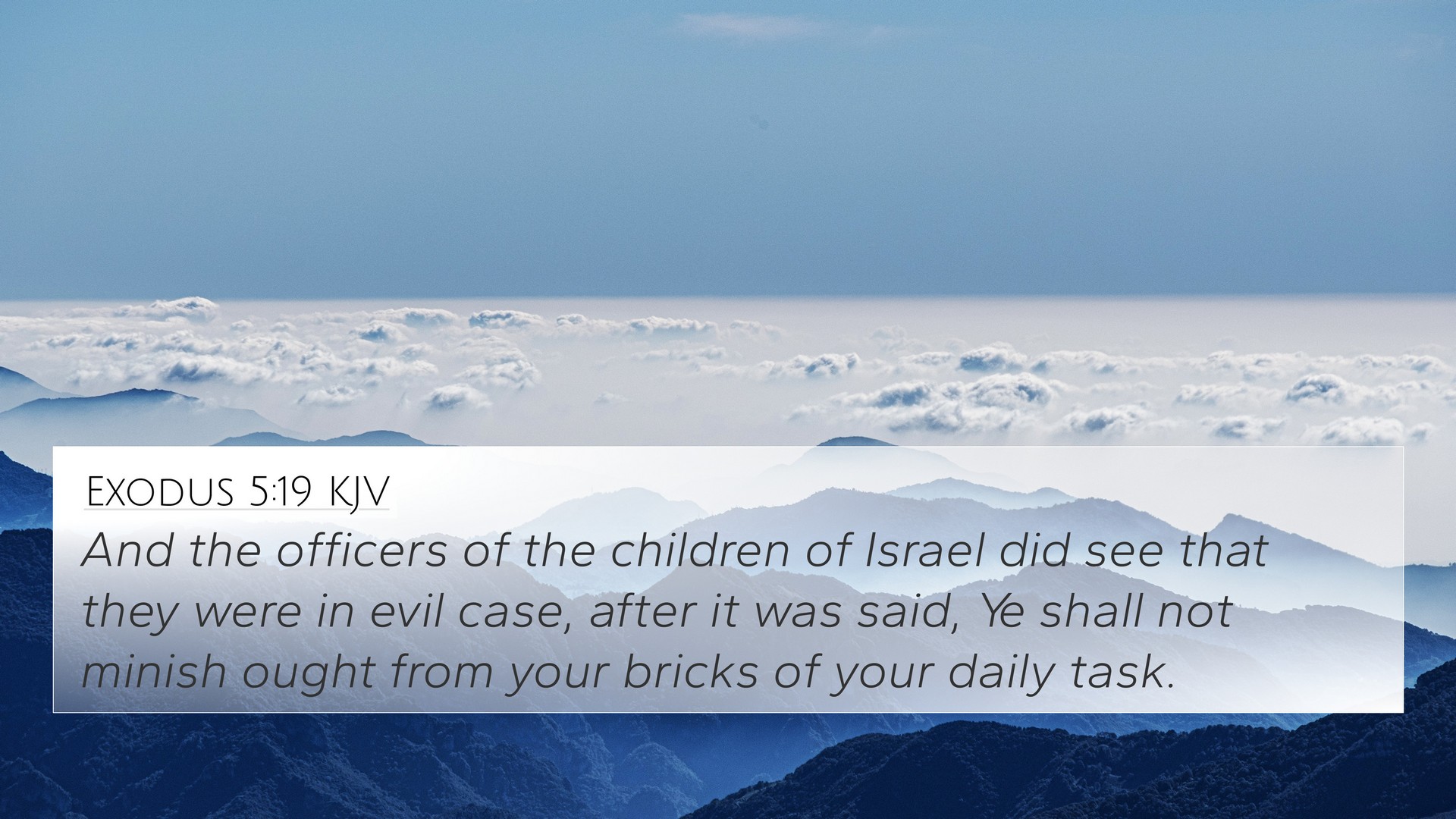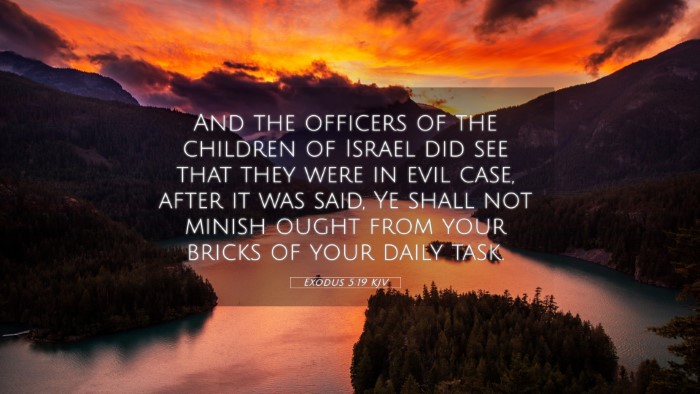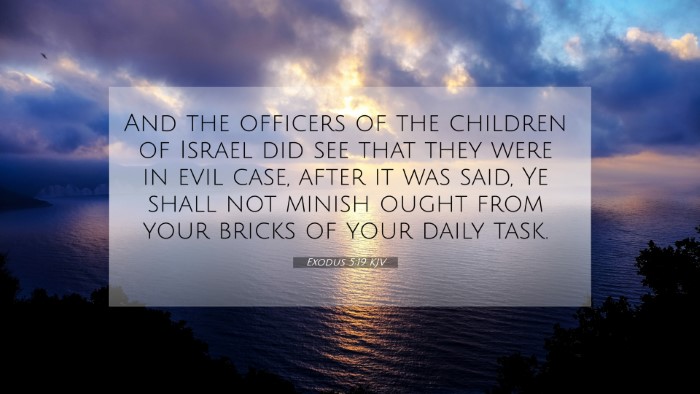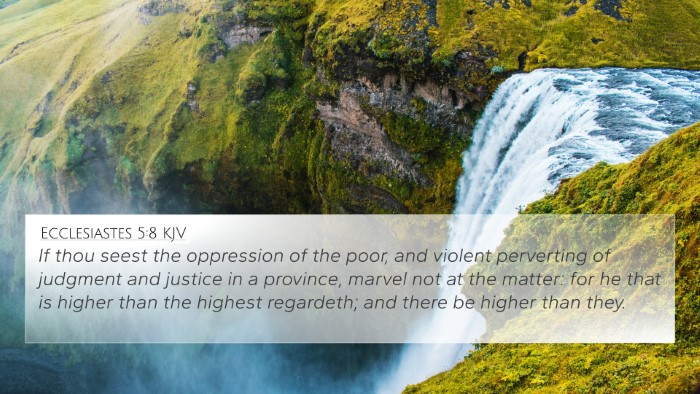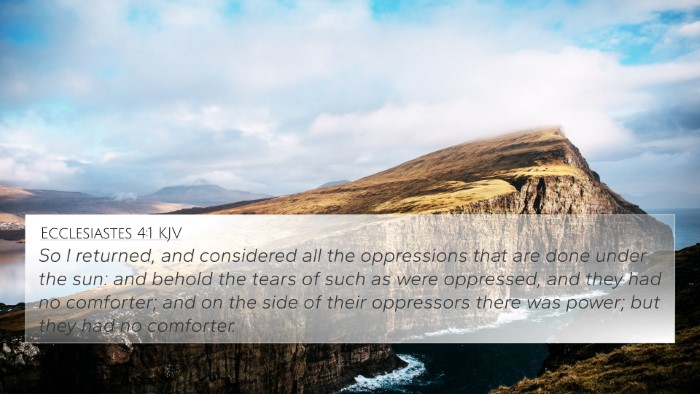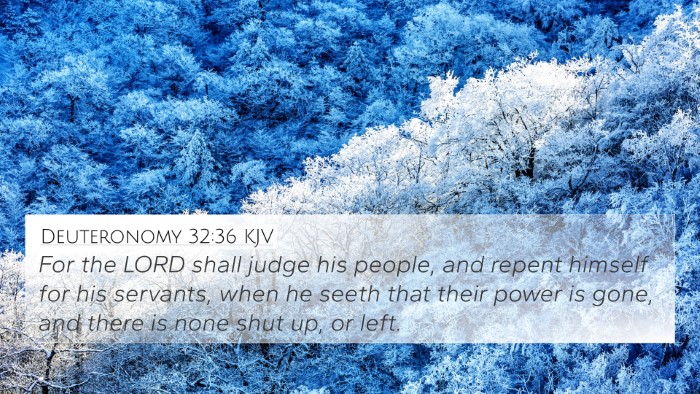Understanding Exodus 5:19
Exodus 5:19 states: "And the officers of the children of Israel did see that they were in evil case, after it was said, Ye shall not minish ought from your bricks of your daily task." This verse illustrates the difficult situation faced by the Israelite laborers under Egyptian bondage as they come to realize the unfairness of their condition following the new commands imposed by Pharaoh.
Context and Significance
This verse is situated within the broader narrative of the Exodus, where God is preparing to liberate His people from slavery. The harsh demands of Pharaoh, which include increasing the Israelites' labor without providing straw as they had before, heighten the sense of despair. Exodus 5:19 serves to highlight the injustices faced by the Israelites while also foreshadowing God's eventual intervention and deliverance.
Commentary Insights
-
Matthew Henry's Commentary: Henry emphasizes the plight of the Israelite officers who faced the dual burden of Pharaoh's oppression and the dissatisfaction of their fellow workers. These leaders understood their predicament was indeed severe, reflecting on the harsh realities of slave labor as they were expected to maintain productivity despite increased difficulties.
-
Albert Barnes' Notes: Barnes notes that the officers' acknowledgment of their "evil case" indicates their realization of the precarious position they were in. The phrase underscores their fear of both Pharaoh's wrath and the anger of the people they were supposed to guide, revealing the leadership's complex role in such harsh circumstances.
-
Adam Clarke's Commentary: Clarke reflects on the deep emotional and physical toll of slavery. He suggests that the officers are distressed not only for their own suffering but also for their fellow Israelites, paralleling the sentiments found throughout Israel's history of oppression and longing for freedom, highlighting the communal aspect of their struggle.
Thematic Connections
Exodus 5:19 connects to several key themes within the Bible, including:
- Oppression and Deliverance: This theme runs throughout the scripture, with the Israelites’ suffering leading to God’s powerful rescue.
- Faith under Trials: The verse speaks to the challenges of maintaining hope in dire circumstances.
- Leadership in Adversity: The roles of the Israelite officers reflect the complexity of leadership amid hardship.
- Divine Justice: The eventual judgment against Pharaoh magnifies God's righteousness amid human cruelty.
Cross-References
To fully grasp the implications of Exodus 5:19, consider these relevant Bible verse cross-references:
- Exodus 1:14 - Illustrates the oppression the Israelites faced in Egypt.
- Exodus 2:23-25 - God hears the cries of the oppressed Israelites.
- Exodus 3:7-10 - God commissions Moses to confront Pharaoh and liberate His people.
- Psalm 34:18 - Emphasizes God's closeness to the brokenhearted and those in despair.
- Isaiah 61:1 - Proclaims liberation for the captives, resonating with themes of Exodus.
- Matthew 11:30 - Jesus offers rest to those burdened, connecting to the hope of relief from oppression.
- Romans 8:18 - The idea that present sufferings are not worth comparing to future glory supports the Israelite experience.
- Hebrews 11:24-26 - Highlights Moses’ recognition of the suffering of his people.
- 1 Corinthians 10:13 - Assurance that God provides a way out amidst trials resonates with the Israelites' plight.
- Revelation 21:4 - The promise of God wiping away every tear is a hope that echoes from the sufferings seen in Exodus.
Conclusion
The verse Exodus 5:19 captures a poignant moment of realization for the Israelite officers, symbolizing broader themes of suffering, leadership, and divine justice. Through careful examination and cross-referencing with related scriptures, one can gain deeper insight into the enduring message of hope, resilience, and the promise of God's intervention in seemingly impossible circumstances. This verse not only serves as a historical account but also as a powerful reminder of the redemptive themes within the biblical narrative.
Resources for Further Study
- Utilize a Bible concordance for detailed cross-references.
- Explore a Bible cross-reference guide to build connections between verses.
- Look into Bible reference resources that offer context and commentary.
- Employ cross-reference Bible study methods to enhance understanding of themes.
- Consider Bible chain references for thematic studies on deliverance and oppression.
